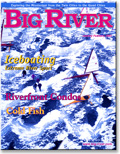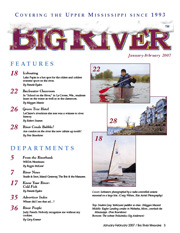January-February 2007 River News excerpts and Links to more information
Instant Fish Passages
Alton, Ill. — The Army Corps of Engineers is considering a fish passage at Melvin Price Lock and Dam at Alton, as part of its Navigation and Ecosystem Sustainability Program. Melvin Price is the first obstacle to big fish trying to swim upstream to spawn and feed. The project is still in the planning stage.
On July 25, the Corps held a public meeting about the proposed project at the National Great Rivers Museum, next to the locks. After the Corps presentation, which mentioned several possible scenarios, such as adjusting dam gates, building a rock ramp or bypass, or removing the dam altogether (illustrated by a picture of a dam exploding [pdf]), members of the audience asked questions and made comments. Jim Bensman of Alton urged that the dam be torn out. A story in Alton’s The Telegraph reported that Bensman said he “would like to see the dam blown up.” Oops!
An Army Corps security manager forwarded the newspaper clipping to the FBI, who then called Bensman for a little talk. The Associated Press (8-26-06) and New York Times (8-22-06) picked up the story, reporting that Bensman, a coordinator with Heartwood, a hardwood-forest protection group, is a perennial critic of the Corps, but not regarded as a terror risk.
Trumpeters Nest in Illinois
For the first time in more than 150 years, a pair of trumpeter swans nested in Illinois last summer, hatching two cygnets in a wetland near Savanna. Both adults had been raised in captivity and released in different marshes near the Mississippi a year apart by the Iowa Department of Natural Resources (DNR).
According to Iowa DNR biologist Ron Andrews, the Savanna pair left the nesting area and were seen on both sides of the river, but with only one cygnet. Swans need open water in the winter, so this family may stick around or may migrate south. Trumpeters winter in west-central Missouri, east-central Kansas, southern Illinois, or sometimes in open water below dams. The largest wintering concentration of trumpeters is in Monticello, Minn., just downstream from a nuclear power plant.
The swan population is nearing sustainable levels in Iowa.
With an eight-foot wingspan, trumpeters are the largest waterfowl in North America. They were once common in the Midwest, but disappeared in the 1890s, due to wetland loss and indiscriminate hunting.
The Iowa DNR has released more than 700 trumpeter cygnets into the wild since 1995. Each bird wears a numbered neck collar.
Old Wetland, New Trail
Volunteers from the Alcoa Davenport Works and several other public and private groups, coordinated by nonprofit River Action, provided labor. They laid down a new trail surface that prevents the fill for the trail from sinking into wetland mud. The material, called “Geo-Web,” is a mesh of perforated, vertical-standing cells that is laid on the ground, with a gravel surface on top.
Nahant Marsh, one of the last wetlands in the Quad Cities urban area, is now a popular environmental education site. It was used for skeet and trap shooting for nearly 40 years. In 1996, the Environmental Protection Agency declared it a Superfund site because of lead shot. Eventually, 143 tons of lead-contaminated soil were removed from the area.
The Nahant Marsh Educational Center, managed by the Putnam Museum, sponsors activities to teach the importance of wetlands and how they benefit water quality, wildlife and humans. River Action
Whooping Progress
Thanks to a coalition of agencies and organizations, whooping cranes continue to make a slow comeback. Three birds from Winnebago County, Iowa, arrived at their wintering grounds in Florida on November 10.
They will be joined, if all goes well, by their Wisconsin neighbors from the Necedah National Wildlife Refuge. From Necedah, new cranes follow ultra-lights on their first autumn journey. As of November 27, the Wisconsin flock and the ultralight crew were resting in Cumberland County, Tenn., having traveled 674.8 miles. In 2005, the cranes had made it to Florida by Dec. 12.
There are 66 birds in the eastern North American wild flock. The only other migrating wild flock consists of some 220 birds at the Wood Buffalo National Park in the Northwest Territories of Canada. And about 55 wild birds live year round in central Florida. Operation Migration
| 


